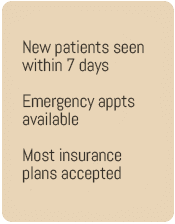ESOPHAGEAL CANCER TREATMENT
The quality of care and life span for cancer patients have increased over the past few decades thanks to advancements in esophageal cancer treatment, with a focus on targeted cancer therapies. The National Cancer Institute reports that new cases of esophageal cancer have been declining by 1.1% every year. At Personalized Hematology-Oncology, we are at the forefront of genetic testing and personalized targeted cancer treatments. Our cancer doctors use their expertise and compassion to treat each particular case of esophageal cancer.
About Esophageal Cancer
Esophageal cancer occurs when mutated cells growth and spread in the esophagus. The two most common types of esophageal cancer are squamous cell carcinoma and adenocarcinoma. Since there are very few early signs or symptoms, cancer of the esophagus is often not diagnosed until it has reached an advanced stage.
Esophageal Cancer Risk & Prevention
The risk factors are different for each type of esophageal cancer. Squamous-cell carcinoma is most often linked to tobacco and alcohol use, while adenocarcinoma is linked to long-term acid reflux as well as tobacco use. Other risk factors can include the regular consumption of very hot beverages, a diet high in processed foods, poor oral hygiene and nutritional deficiencies.
Esophageal Cancer Symptoms
Symptoms typically do not present in patients with esophageal cancer until the tumor has grown significantly. The most common symptom is problems swallowing, which is also called dysphagia. Dysphagia will typically present as a mild case and gradually get worse.
Symptoms of Esophageal Cancer
- Difficulty swallowing
- Pain when swallowing
- Chest pain
- Weight loss
- Nausea and vomiting
- Coughing or vomiting blood
- Aspiration pneumonia
Esophageal Cancer Early Detection & Diagnosis
Since esophageal cancer symptoms often do not present until late in the progression, it is important to discuss any symptoms with your doctor as soon as they occur, especially if you are experiencing difficulty swallowing. Diagnosis is most often done through an endoscopic examination of the esophagus. Some tumors may also be discovered through a barium swallow test, X-Rays, or CT, MRI and PET scans.
Esophageal Cancer Treatment in Raleigh, NC
At Personalized Hematology-Oncology, we believe what works is different for every patient. That is why we develop a personalized approach to esophageal cancer treatment. Our experts in chemotherapy, targeted molecular therapies, genome science and infusion administration work together to create gene expression profiles of the tumor to determine the best drugs and treatment options for the specific type.

